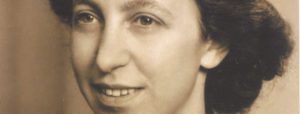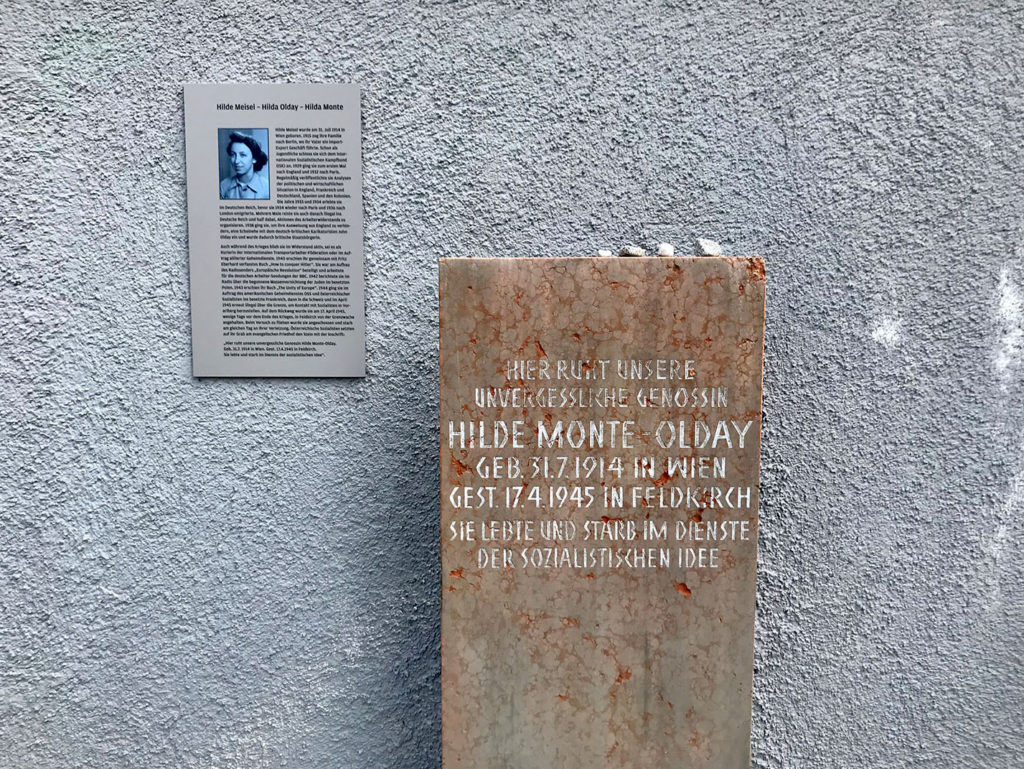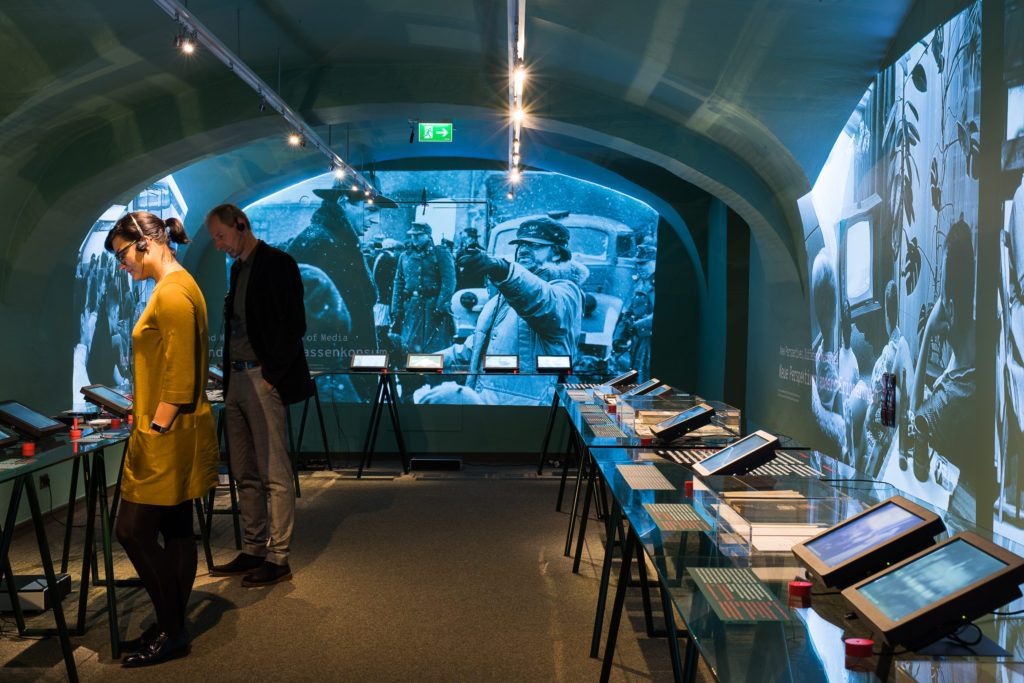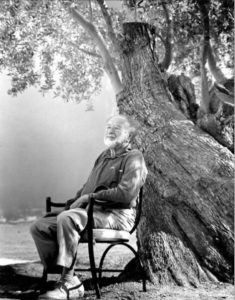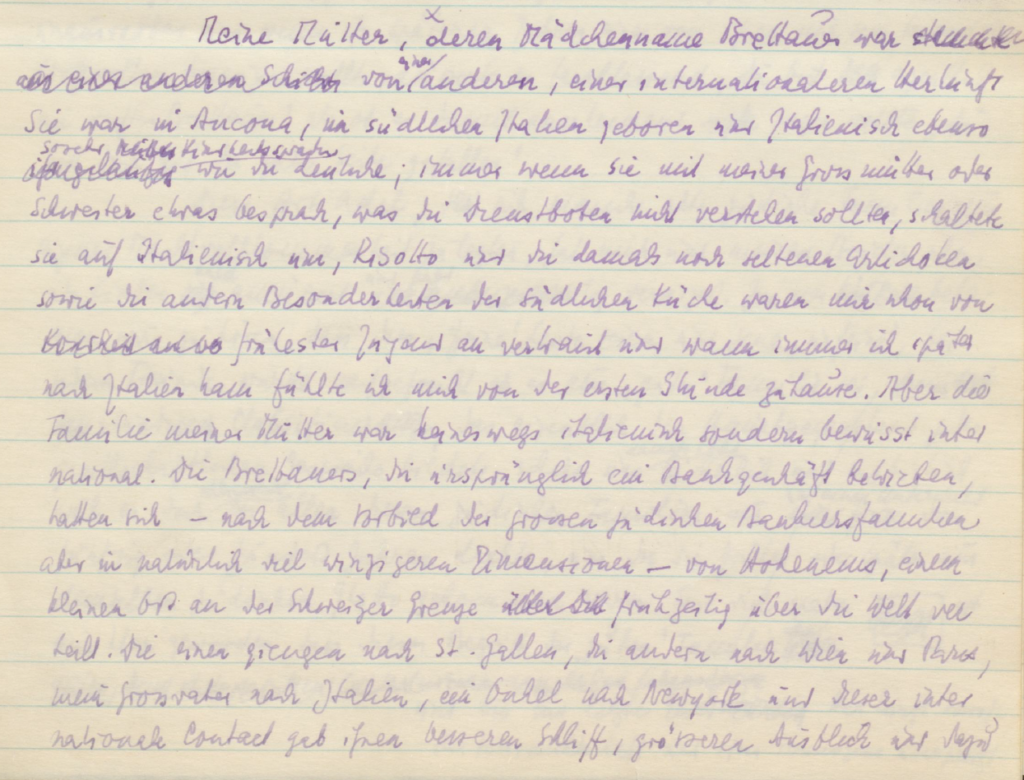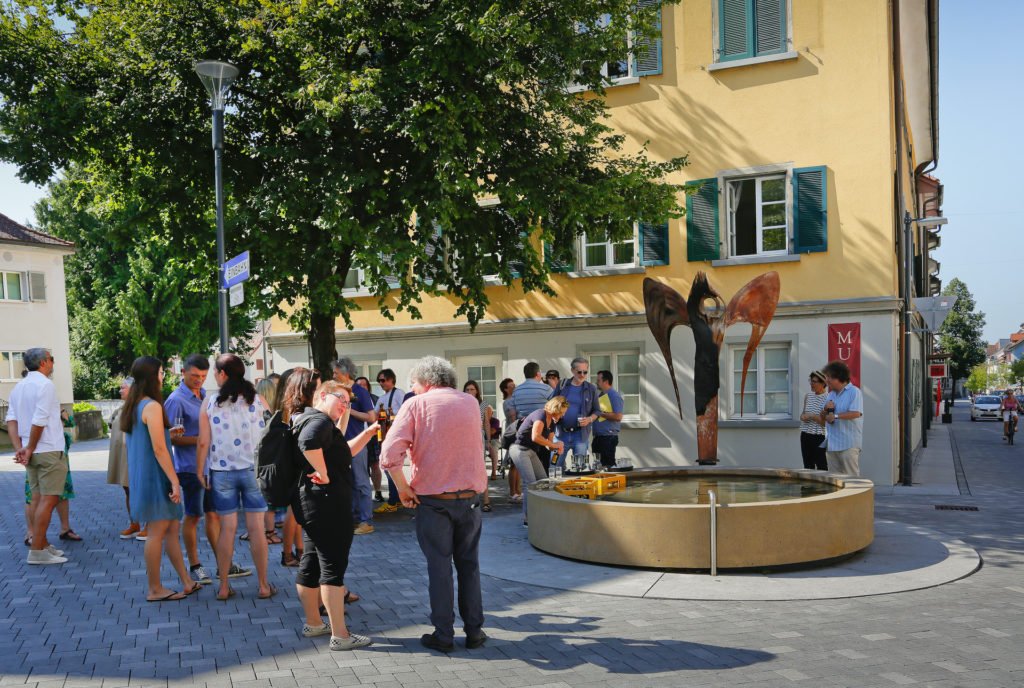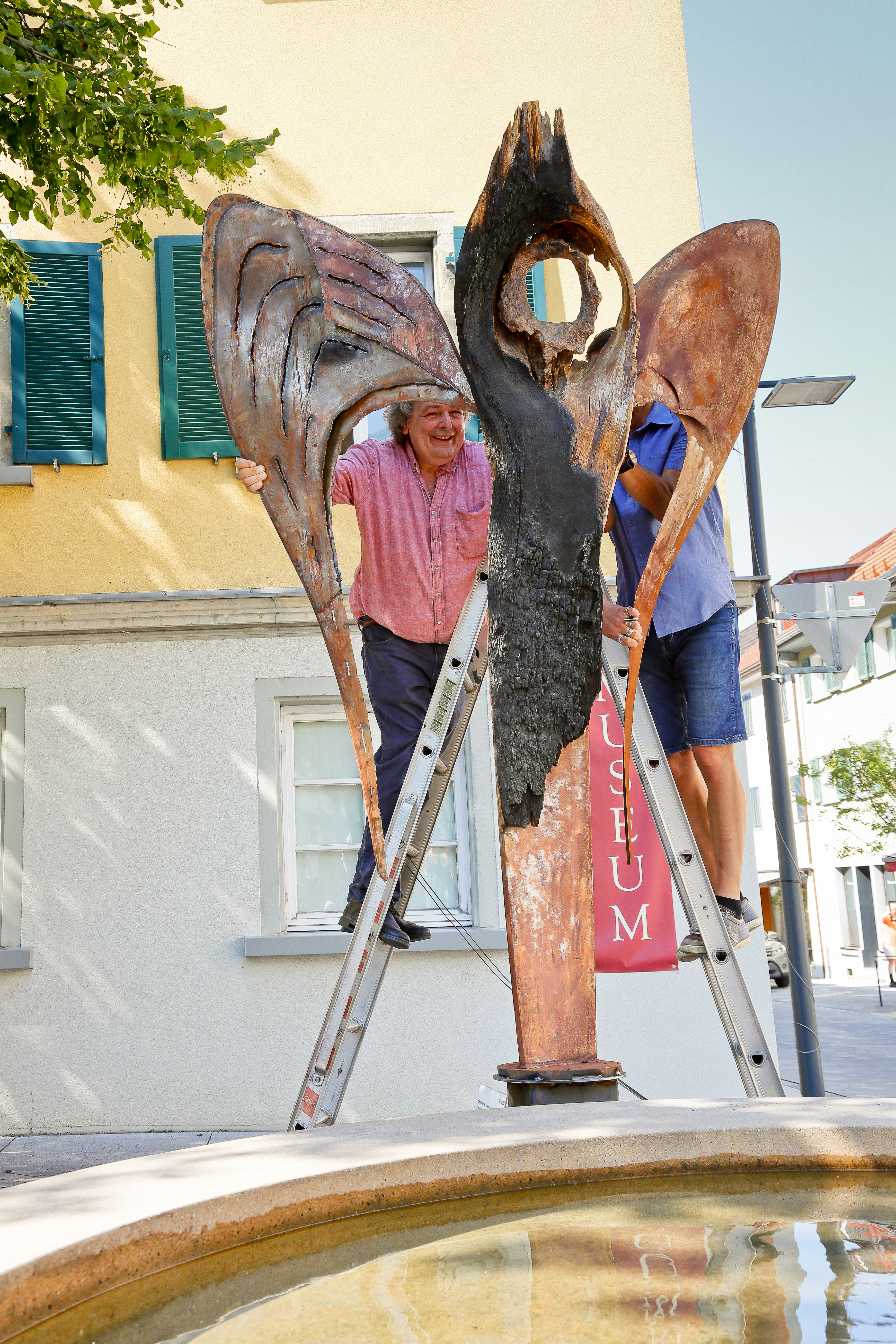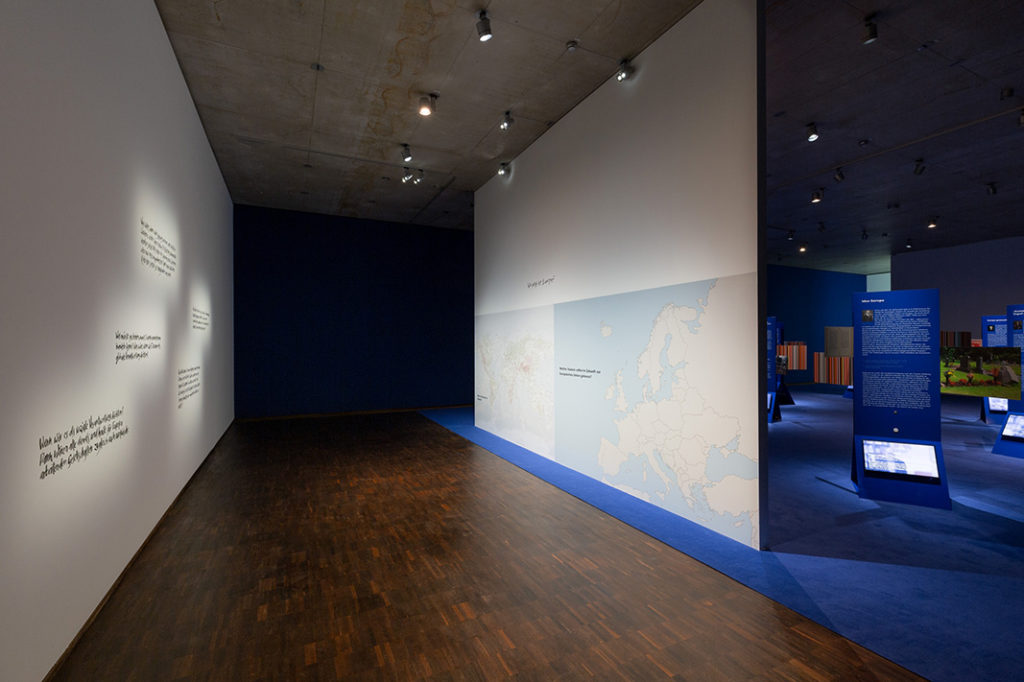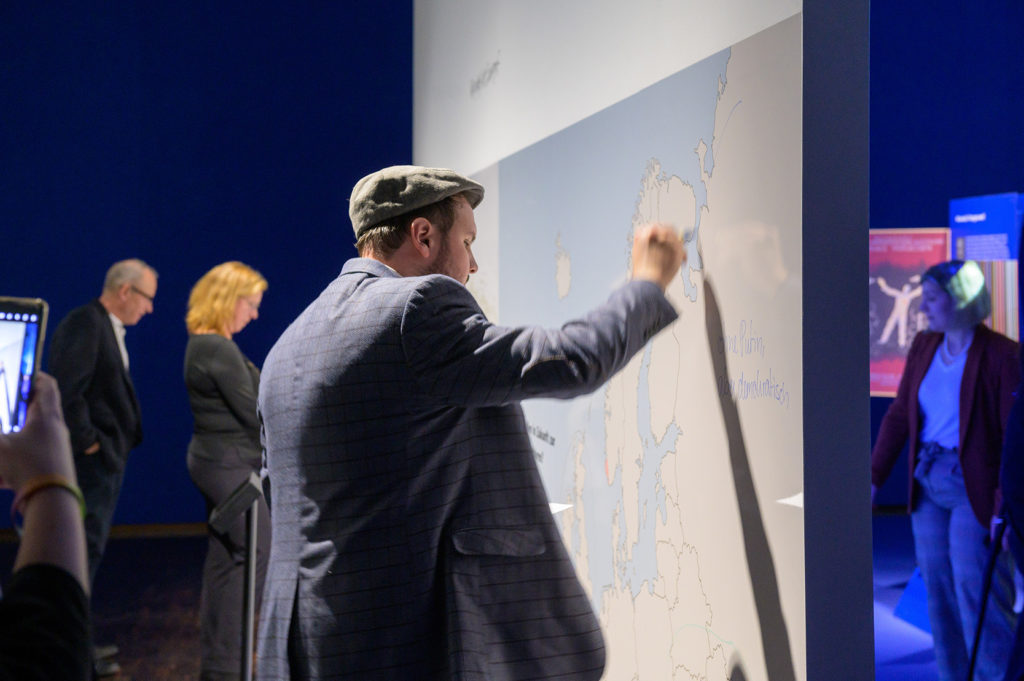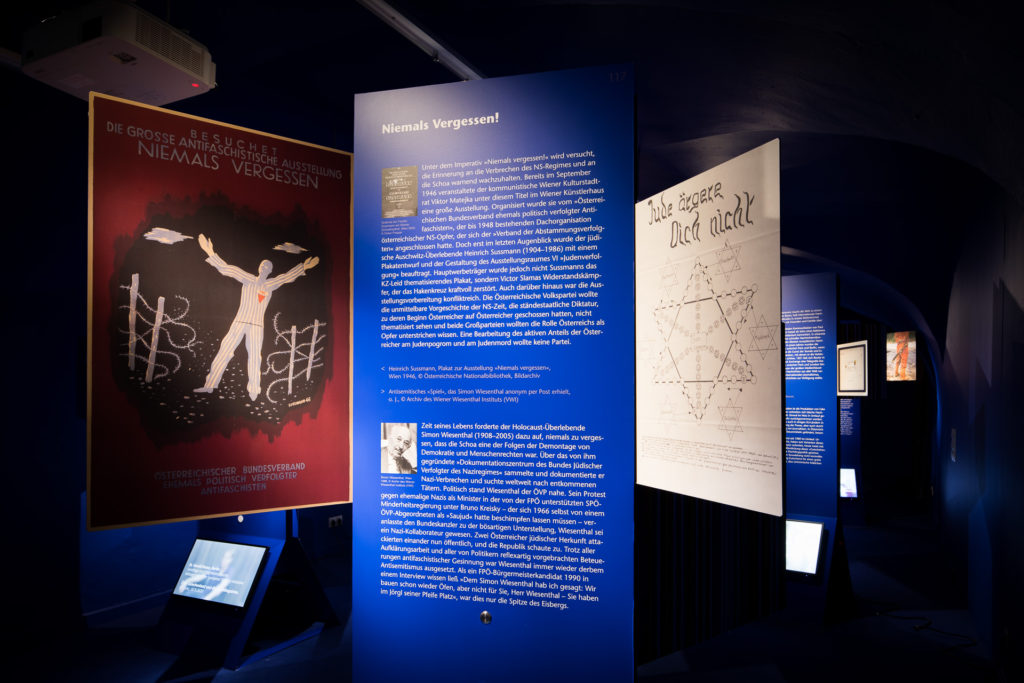There is international resistance to the announced appointment of the extreme right-wing politician Effi Eitam as the new chairman of Yad Vashem, the prestigious ‘World Holocaust Remembrance Centre’ and museum in Jerusalem. In a joint declaration, Jewish and non-Jewish scholars and employees of Jewish museums, Holocaust memorial sites, university and non-university research and educational institutions, and archives around the world protest strongly against this worrying move which threatens to instrumentalize one of the most important Holocaust memorial institutions in the world for partisan political interests. Within a few days, more than 750 international signatories have joined the appeal.
Scholars and professors of Jewish Studies and History in the USA, Israel, Germany, Great Britain, Switzerland, Austria, Australia, Hungary, Poland, South Africa, Canada, Brazil, France, Czech Republic etc: including Omer Bartov, Paul Mendes-Flohr, Michael Berenbaum, Deborah Lipstadt, Steven Aschheim, Barbara Kirshenblatt-Gimblett, James Young, Sander Gilman, Norbert Frei, Aleida and Jan Assmann, Michael Brenner, Marion Kaplan, Derek Penslar, Ron Barkai, Alfred Bodenheimer, Dariusz Stola, Vivian Liska, Daniel Boyarin, Gertrud Koch, Shulamith Volkov, Peter Hayes, Konrad Kwiet, Christoph Schulte, Deborah Dwork, John Efron, Amos Goldberg, Moshe Zimmermann, Moshe Rosman, Lawrence Baron, Joel Rubin, Anson Rabinbach, Micha Brumlik, Atina Grossman, David Myers, Jacques Picard, Liliane Weissberg, René Bloch, Alan Steinweis, Christina v. Braun, Michael Steinberg and many more.
Directors and staff members of numerous Jewish museums, Holocaust memorials, educational centers, research institutes and archives in the USA, Germany, Austria, Poland, Hungary, the Netherlands, Spain, Slovakia, Greece, Turkey and Israel
including Zsuzsanna Toronyi (Jewish Museum Budapest), Volkhard Knigge (former director of the Buchenwald Memorial), Stefanie Schüler-Springorum (Center for Research on Anti-Semitism, Berlin), Zygmunt Stępiński (Director of the Museum Polin, Warsaw), Sybille Steinbacher (Fritz Bauer Institute Frankfurt a.M. ), Miriam Zadoff (NS Documentation Center Munich), ), Lori Starr (former director of the Contemporary Jewish Museum, San Francisco), Martha Keil (Institute for Jewish History of Austria), Miriam Rürup (Moses Mendelssohn Center, Potsdam), Daniela Eisenstein (Jewish Museum Franconia), Maros Borsky (Jewish Museum Bratislava), Barbara Staudinger (Jewish Museum Augsburg), Zanet Battinou (Jewish Museum Athens), Bernhard Purin (Jewish Museum Munich), Anja Siegemund (Centrum Judaicum Berlin) and many others.
Writers, artists and filmmakers including Lizzie Doron, Max Czollek, Doron Rabinovici, Amos Gitai, Ruth Beckermann, Melvin Jules Bukiet, Michal Rovner, Abraham Burg (the former speaker of the Knesset) and rabbis such as Andreas Nachama (President of the General Rabbinical Conference in Germany) have also added their names in protest.
For the initiators of the appeal:
Felicitas Heimann-Jelinek (independent curator and museologist, Vienna)
Hanno Loewy (Director, Jewish Museum Hohenems, Austria)
Joanne Rosenthal (former chief curator of the Jewish Museum London)
Cilly Kugelmann (Chief Curator of the Permanent Exhibition of the Jewish Museum Berlin)
Susannah Heschel (Professor of Jewish Studies, Dartmouth, USA)
OPPOSITION TO THE SUGGESTED APPOINTMENT OF EFFI EITAM AS CHAIR OF YAD VASHEM
“For many years the Israeli Holocaust memorial Yad Vashem, its archives and research departments, has been one of the most important partners of our work, wherever we are situated, whether Jewish or non-Jewish scholars of Holocaust, Antisemitism and Jewish studies, active in universities, museums, archives, education or research.
Yad Vashem, the Israeli state ‘Memorial to the Martyrs and Heroes of the State of Israel in the Holocaust’ commemorates the Nazi extermination of the Jews. Its declared goal is not only documentation, research and education but also prevention – of barbarity and future acts of genocide. The International School for Holocaust Studies, which is part of the memorial, aims at combatting anti-Semitism, racism and exclusion within society at large.
This urgent mission – to encourage civil society to actively watch, involve and intervene wherever racism and hatred threaten religious, ethnic or other groups and communities – is now at risk of being handed over to the outspoken right-wing extremist and historically illiterate politician Effi Eitam.
We are shocked by this outrageous proposal and protest against it in the strongest possible terms. Eitam’s hateful rhetoric towards Israeli Arabs and Palestinians stands in opposition to the stated mission of Yad Vashem.
We add our voices to the protests of many notable Holocaust survivors in Israel who have spoken out against this proposed appointment. Appointing Effi Eitam as Chair of Yad Vashem would turn an internationally respected institution devoted to the documentation of crimes against humanity and the pursuit of human rights into a mockery and a disgrace.”
List of Signatories:
Gisèle Abazon, Interpreter, Israel
Irit Abir, Israel
Prof. Dr. David Abraham, Professor of Law, University of Miami, USA
Mr. Shai Adar, Tel Aviv Sexual Assault Crisis Center, Volunteer and Board Member, Israel
Nance Adler, JDS Seattle – Jewish Studies, USA
Dr. Mehnaz Afridi, Holocaust, Genocide and Interfaith Education Center, New York, USA
Dr. Michal Aharony, University of Haifa, Editor, The Journal of Holocaust Research, Israel
Dr Avril Alba, University of Sydney, Australia
Mr Jonathan Alexandre, Israel
Mr Mario Dominic Alfonso, USA
Dr Jean-Rémi Alisse, Israel
Mr Yuval Alpan, Israel
Dr. Karen Alterthum-Wajsberg, Children and Adolescent Psychiatrist, Munich, Germany
Mr Eitan Amiel, Israel
Prof. Rabbi Yehoyada Amir, Hebrew Union College – Jewish Institute of Religion, Israel
Marita Anderson, Chaplain at Northside Hospital, USA
Claire Andrieu, History Professor, Sciences Po, Paris, France
Professor Shoshana Anily, Tel Aviv University, Israel
Mr Léo Apotheker, UK
Mrs Liliane Apotheker, UK
Jack Arbib, Israel
Mr Bertie Aronson, Israel
Professor Steven Aschheim, Emeritus, Hebrew University, Israel
Ofer Ashkenazi, Associate Professor, Director, The Koebner-Minerva Center for German History, The Hebrew University of Jerusalem, Israel
Prof. Dr. Aleida Assmann, University of Konstanz, Germany
Dr Roger Assouline, Israel
Prof. Dr. Jan Assmann, Universities of Heidelberg and Konstanz, Germany
Dr Irene Aue-Ben-David, Director, Leo Baeck Institute Jerusalem, Israel
Karen Auerbach, University of North Carolina, associate professor of history, USA
Arie Avidor, Ambassador (ret.), Israel
Bernard Avishai, Visiting Professor of Government, Dartmouth College, USA / Israel רחל ארבל ,ישראל
פנחס ביבלניק ,האוניברסיטה העברית ירושלים ,ישראל
אריאלה בכר ,ישראל
Professor Anthony Bale, Birkbeck College, University of London, UK
אילו בר ,עצמאי ,ישראל
Naomi Ban, Israel
Dr Ronald Ban, Israel
Rabbi Ehud Bandel, Israel
Dr. Yair Barak, Research fellow Cohn Institute Tel Aviv University, Israel
Miriam Barak, Israel
Prof. Emeritus David Bar-Gal, Hebrew University, Israel
Uri Barbash, Film and TV Director, Israel
Hillel Bardin, Israel
Ron Barkai, Professor Emeritus, Tel Aviv University, Israel
Thamar Barnett, Holocaust Educator, UK
Lawrence Baron, Professor Emeritus, San Diego State University (retired), USA
Professor Omer Bartov, Brown University, USA
Professor Neima Barzel, Oraim college of education, Israel
Prof. Dr. iur. J.Friedrich Battenberg, Technical University Darmstadt, Department of History, Germany
Ms. Zanet Battinou, Director, The Jewish Museum of Greece, Greece
Mrs Laure Baumgarten, France
Sammy Beck, Director, Practicing Medicine Program, Cornell University, USA Professor Annette Becker, Paris-Nanterre, Genocide Studies, France
Ruth Beckermann, Filmmaker, Austria
Dr. Michael Beigel, Director, Multimedia Assisted Learning, The Faculty of Medicine, The Hebrew University, Israel
Sylvia Beigel, Teacher, Alyn Rehabilitation Hospital, Israel Claudette Beit-Aharon, Child of Survivor, USA
Dr. Margalit Bejarano, Hebrew University (Research Fellow), Israel Ruth Belluco, Israel
Galit Ben Ami, Israel
Batsheva Ben-Amos, Shoah scholar, Philadelphia
Professor Dr. Shlomo Ben-Hur, IMD Business School, Switzerland David Ben Ishay, Direction de projets environnementaux, Israël
מנשה בן מאיר ,מרחב תרבות ,ישראל
Dr. Michal Ben-Nun, San Diego, CA, USA
Professor Ram Ben-Shalom, The Hebrew University, Israel
Ms. Orit Ben Shitrit, Film Department Chair, San Francisco Art Institute, USA
Professor Hanoch Ben-Yami, Central European University, Austria
Ohad Ben Itzhak, Israel
Mr Shmuel Ben-Tovim, Director, BTC Ltd., Israel
Nesim Bencoya, Turkey
Isaac Benguigui, Prof. University of Geneva, Switzerland
Tal Benoliel, Hebrew teacher, France
Ms. Anat Benson, Israel
Ms Valérie Bercovici, Israel
Michael Berenbaum, Professor of Jewish Studies, American Jewish University, USA
Elie Beressi, France
Professor Andrew Stuart Bergerson, Department of History, University of Missouri-Kansas City, USA
Bonnie Berkowicz, USA
Dr. Nathaniel Berman, Rahel Varnhagen Professor, Dept. of Religious Studies, Brown University, USA
Dr. Margit Berner, Austria
Daniel Bessis, Delegate for innovation, Israel and France
Dr. Henry Bial, Professor, University of Kansas, USA
Dr. Pinhas Bibelnik, Hebrew University of Jerusalem, Israel
Professor (emeritus) Yoram Bilu, Prof. of anthropology and psychology Hebrew University, ISRAEL
Professor Marco Antonio Bin, PUC SP, Brasil Professor Daniel Blatman, Hebrew University, Israel
Mr Bruno Bloch, Cercle de Genealogie Juive, France
Carine Bloch, France
Professor René Bloch, University of Bern, Institute of Jewish Studies, Switzerland
Dr. Lisa Bloom, University of California, Berkeley, USA
Mr Remi Blum, Masorti congregation secretary in Neve Tzedek, Israel
Dr. Rachel Blumenthal, Hebrew University of Jerusalem, Israel
Mr Bruno Boccara, Socio-Analytic Dialogue, USA
Professor Alfred Bodenheimer, Director of the Center for Jewish Studies, University of Basel, Switzerland
Miriam Bodian, University of Texas at Austin, USA
Professor Dr Omri Boehm, The New School for Social Research, Israel/ USA
Dr. Maroš Borský, Jewish Community Museum and Jewish Cultural Institute, Bratislava, Director, Slovak Republic
Rabbi Dr Barbara Borts, Newcastle University, UK Professor Viviana Bosi, Universidade de São Paulo, Brazil
Dr. Sabina Bossert, Fachreferentin Jüdische Zeitgeschichte am Archiv für Zeitgeschichte der ETH Zürich, Switzerland
Professor Daniel Boyarin, Taubman Prof. of Talmudic Culture, UC Berkeley, United States
Prof. Dr. Stephan Braese, RWTH Aachen University, Germany
Dr. Elisabeth Brainin, Psychoanalyst, Vienna Psychoanalytic society (WPV), Austria Professor Zachary Braiterman, Syracuse University , USA
Caroline Bray, Museum Consultant, UK
Professor Michael Brenner, American University, Washington DC and University of Munich, USA Professor Haim Bresheeth, SOAS, University of London, UK
Claparede albernhe Brigitte, France
Mrs. Aline Brodt, Brodt Center for Jewish Culture, Israel
Susan Bronson, Executive Director, Yiddish Book Center, USA
Dr. Rivka Brot, Tel Aviv University Faculty of Law, Israel
Max Yeshaye Brumberg-Kraus, Artist with ARC (Arts, Religion, Culture), USA
Dr. Micha Brumlik, Selma Stern Zentrum für Jüdische Studien Berlin, Germany
Tal Bruttmann, Historian, France
Melvin Jules Bukiet, author, Sarah Lawrence College, Board Member of the American Friends of Yad Vashem
Mr Avraham Burg, Former Speaker of the Knesset, Israel
Rauzel Candib, Retired School Administrator, Montreal, Quebec
Dr. Katerina Capkova, Institute of Contemporary History, Czech Academy of Sciences, Czech Republic
Professor Marc Caplan, Dartmouth College, Visiting Professor of Jewish Studies, USA Steven Carr, Purdue University Fort Wayne, USA
Galia Chai, Israel
Isolde Charim, Austria
Prof. Israel Charny, Director, Institute on the Holocaust and Genocide Jerusalem, Co-Founder, Internaitonal Association of Genocide Scholars, Israel
David Chemla, JCall, European general secretary, France
Nancy Civin, Baltimore Jewish Council, Holocaust Remembrance Council, USA
Tsila Cochavi, Israel
Carine Cohen Libermann, Law Student, Israel
Dr. Elliot (Yisrael) Cohen, Retired from Yad Vashem, Hebrew University, Israel
Professor Emerita Esther Cohen, Department of History, The Hebrew University of Jerusalem, Israel
Judith Cohen, Retired teacher, Ort, Israel
Julie-Marthe Cohen, curator, Jewish Historical Museum, Amsterdam, The Netherlands
Prof. Richard Cohen, The Hebrew University, Jerusalem, Israel
Professor Veronika Cohen, Jerusalem Academy of Music and Dance, Israel
Ms Catherine Colloms, Trustee, Wiener Holocaust Library, UK
Alon Confino, Pen Tishkach Chair of Holocaust Studies, Director of the Institute for Holocaust, Genocide and Memory Studies, University of Massachusetts, Amherst, USA
Dr Bryan Conyer, Bialik College, Australia
Jonathan Crewe, Dartmouth College, USA
Roz Currie, Curator at Islington Museum, formerly curator at Jewish Museum London, UK Sarah Cushman, Director, Holocaust Educational Foundation of Northwestern University, USA Anat Cygielman, Journalist, Israel
Dr. Max Czollek, Author, Germany
דפנה דה הרטוך ,ישראל
Talia Dadash, Israel
Sebastian Dallinger, Austria
danielle danielle, retraitée, CNRS, France, Israel
Patrick Danis, France
Paige Dansinger, Director, Better World Museum, USA
Emmanuel Darmon, France
Tamar Daus, Israel
Dr. Efraim Davidi, Tel-Aviv University, Israel
Professor SIDRA DeKOVEN EZRAHI, Hebrew University of Jerusalem, Israel
Dr. Aviv De-Morgan, Israel
Dr Anath Ariel de Vidas, CNRS, France
Dr. Irit Dekel, Assistant Professor, Jewish Studies and Germanic Studies, Indiana University, USA
Professor Mikhal Dekel, Professor and Director of the Rifkind Center for the Humanities & Arts, City University of New York, USA
Prof. Dr. Astrid Deuber-Mankowsky, Ruhr-Universität Bochum, Germany Annalisa Di Fant, Historian, Italy
Emily Dische-Becker, Journalist & researcher, Berlin, Germany
Weill Dominique, Lawyer, France
Lizzie Doron, Writer, Israel
Dr. Axel Doßmann, University of Jena, Germany
Rachel Douieb, Author, composer, Musician, curator, France
Daniel Dratwa, former museum curator, Belgium
Dr. Werner Dreier, erinnern.at, director, Austria
Laura Dressel, Austria
Dr. Jean-Marc Dreyfus, Reader in History, the University of Manchester, UK
Marcel Drimer, Holocaust survivor USHMM, USA
Dr. Gali Drucker Bar-Am, Israel
Dr. Irith Dublon-Knebel, Minerva Institute for German History, Tel Aviv University, research fellow, Israel
Prof Arie Dubnov, Associate Professor of History & Max Ticktin Chair of Israel Studies Director, Judaic Studies Program The George Washington University, USA
Dr. Rina Dudai, Kibbutzim College of Education (retired), Israel Ms Joanne Dufty, Sydney, Australia
Shoshana Dweck, USA
Prof Deborah Dwork, Director, Center for the Study of the Holocaust, genocide, and Crimes Against Humanity; Graduate Center–CUNY, USA
Dr. Tobias Ebbrecht Hartmann, Cardinal Franz König Chair in Austrian Studies, The Hebrew University of Jerusalem, Israel
Monique Eckmann, Prof. em. University of Applied Sciences and Arts, Geneva, Switzerland
Professor John Efron, Koret Professor of Jewish History, University of California—Berkeley, USA
Daniela F. Eisenstein, Director, The Jewish Museum Franconia – Fürth, Schnaittach & Schwabach, Germany
Dr. Sagi Elbaz, Tel Aviv University, Israel
Dr. Yair Eldan, Law Faculty, Ono academic College, Israel
Allal Elie, France
Dr. Aya Elyada, Hebrew University of Jerusalem, Israel
Pierre Ech-Ardour, France
Sandy Fainer, Canada
Mrs Yael Falk, Israel
Sandro Fasching, Vienna Wiesenthal Institute for Holocaust Studies (VWI), The Future of Memory – Museum Simon Wiesenthal, Austria
Mr Sam Fayon, Director, Switzerland
Prof. Dr. Liliana Ruth Feierstein, Humboldt Universität Berlin, Germany
Professor Jackie Feldman, Ben Gurion Universität of the Negev, Professor of Anthropology, Israel
Prof. Miriam Feldon, Tel Aviv University, Israel
Dr. Michaela Feurstein-Prasser, XHIBIT.AT, Curator, Austria
Jacques Fijalkow, Professor emeritus, université de Toulouse, France
Raymonde Fiol, Past President, Holocaust Survivors Group of Southern Nevada, USA
Chuck Fishman, Photographer / historian, USA
Louise Fishman, USA
Shlomit Fishman, Israel
Professor Henryk Flashner, University of Southern California, USA
Professor Sandy Flitterman-Lewis, Rutgers University, USA
Dr. David Forman, Cornell University, USA
Professor Everett Fox, Glick Professor of Judaic and Biblical Studies, Director, Program in Jewish Studies, Clark University, USA
Dr. Daniel Fraenkel, (Retired), Director of the Yad Vashem Encyclopedia of Jewish Communities in Germany, Israel
Karen S. Franklin, USA
Ms Carol Freeman, Director, Melisma Arts, USA
Prof. ChaeRan Freeze, Professor, Brandeis University, USA
Prof. Dr. Norbert Frei, University of Jena, Germany
Laura Freidberg, UNAM, Mexico
Professor Eli Friedlander, Philosophy, Tel Aviv University, Israel
Mr Dominique Friedman, Sept & demi Incoming Europe, Chairman, France
Jeanette Friedman, President, the Brenn Institute, USA
Jordan Friedman, Hebrew Seminary for the Deaf and Hearing, USA
Professor Dr. Judith Frishman, Leiden University, Jewish Studies, Netherlands
Eva Frojmovic, Associate Professor, University of Leeds, UK
Dr. Iris Fry, Israel
Professor Emeritus Michael Fry, Technion – Israel Institute of Technology, Israel
Sarah Gabbai, Retired Journalist, Israel
Professor Ofer Gal, University of Sydney, Australia
Dr Yoav Galai, Lecturer in Global Political Communication, Royal Holloway, University of London, UK
Professor Katharina Galor, Program in Judaic Studies, Brown University, USA Mr Tsahi Ganon, Israel
Dr. Daniel Gerson, University of Bern,Institute of Jewish Studies, Switzerland Dr. Sharon Geva, Kibbutzim College and Tel Aviv University, Israel
Erika Gideon, Switzerland
Noa Gidron, Retiree, Independent Holocaust researcher, Israel
Mr Binyomin Gilbert, UK
Smadar Gilboa, USA
Professor Abigail Gillman, Professor of Hebrew, German, and Comparative Literature, Boston University, USA
Professor Sander Gilman, Emory University , USA
Hans Jakob Ginsburg, Journalist, Germany
Prof. Yonatan Ginzburg, Professor of Linguistics, Université de Paris, France
Oren Giorno, Youth Director at Judaïsme en Mouvement, France
Rabbi Dr. Irving Yitz Greenberg, Senior Scholar in Residence,Hadar Institute, USA and Israel
Professor Amos Guiora, USA
Amos Gitai, Professor college de France, Israel
Mr. Carlos Gitin Hochberg, Son to a survivor, Brasil
Dr. Mario Glanc, Argentina
Tamara Gleason, University College London, UK
Yael Glickman, Israel
Nechama Gliksberg, Israel
Jason Gold, Legal Counsel, Canada
Prof. Amos Goldberg, The Hebrew University of Jerusalem, Israel
Dr. Jean Goldenbaum, Researcher at the European Centre for Jewish Music (Music University of Hannover), Germany
David Goldfarb, Independent scholar and translator, USA
President John Goldsmith, Anne Frank Fonds (Trust), Basel, Switzerland
Ms. Alexa Goldstein, AJEEC-NISPED, Resource Development Coordinator, Israel
Dr Noami Goldstein, Grand daughter of shoah survivors, Israel
Dr. Yossi Goldstein, Hebrew University of Jerusalem, lecturer, Israel
Rabbi Samuel Gordon, Senior Rabbi, Congregation Sukkat Shalom, USA
Geoff Gottlieb, USA
Alain Tsion Grabarz, Hashomer Hatsaïr (president), France
Professor Henry Green, Department of Religious Studies and Judaic Studies, University of Miami, USA
Dr. Jeffrey Green, Translator, Israel
Judith Green, Hebrew University, Israel
Prof. Charles Greenbaum, The Hebrew University of Jerusalem, Israel
Reesa Greenberg, Art and Exhibition Historian, Canada
Rabbi Yehiel Grenimann, Rabbis For Human Rights, Israel
Dr. Leonard Grob, Professor Emeritus, USA
Ms Nili Gross, Israel
William Gross, Director of the Gross Family Collection, Israel
Professor Atina Grossmann, Professor of History, Cooper Union, New York, USA
Ruth Ellen Gruber, Author, “Virtually Jewish: Reinventing Jewish Culture in Europe”, Italy/Hungary/USA
Dr. Samuel Gruber, President, International Survey of Jewish Monuments, USA Dr. Karen Grumberg, University of Texas at Austin, USA
Rabbi Nardy Grun, Tkasim, Israel
Prof. Wolf Gruner, Shapell-Guerin Chair in Jewish Studies, Professor of History, Founding Director USC Shoah Foundation Center for Advanced Genocide Research, University of Southern California, USA
Yosef Grunfeld, Israel
Professor Francois Guesnet, University College London, UK
David Guez, France
Paula Guitelman, University of Buenos Aires, Argentina
Dr. Stefan Gunther, USA
Hila Gutmann, Israel
Rivka Gutman, Architect, Bezalel Academy of Arts and Design Jerusalem, Israel
Prof. Ruth HaCohen, The Hebrew University of Jerusalem, Artur Rubinstein Professor of Musicology, Israel
DYNEL Hanan, Journaliste, ISRAEL
Sarah Harel Hoshen, Israel
Professor Galit Hasan-Rokem, The Hebrew University, Jerusalem, Israel
Dr. Peter Hayes, Professor Emeritus of History and Holocaust Studies, Northwestern University, USA
Georges Haymann, France
Professor emeritus Irene Heidelberger-Leonard, Professorial research fellow at Queen Mary College, London, UK
Barbara Heller, Researcher, Universidade Paulista (Brazil), Brasil Ms Claudia Heller, Unesp, Brazil, Brazil
Prof. Dr. Johannes Heil, Ignatz Bubis-Lehrstuhl, Hochschule für Jüdische Studien Heidelberg, Germany
Viola Heilman, Journalistin, Graz
PD Dr. Susanne Heim, Berlin, Germany
Dr Felicitas Heimann-Jelinek, Independent curator, Austria
Professor Elizabeth Heineman, Professor of History, University of Iowa, USA
Mr Rami Heled, Israel
Dr. Lois Helmbold, San Jose State University, professor emerita, USA Tammy Hepps, Independent researcher, USA
Ariel Herman, Israel
Dr. Manja Herrmann, Selma Stern Center for Jewish Studies Berlin-Brandenburg, Germany
PhD Medical doctor Albert Herszkowicz, Chairperson Memorial98 association, France
Joel Herzog, Swiss Friends of Yad Vashem, Switzerland
Professor Susannah Heschel, Eli M. Black Distinguished Professor of Jewish Studies, Dartmouth College, USA
Professor Hannan Hever, Yale University, USA
Brad Sabin Hill, Washington DC, USA
Dr Odelia Hitron, Israel
Dr. Sabine Hödl, Institut für jüdische Geschichte Österreichs, Austria Mrs Osnat Hochman Gerhard, Legal Counsel, Israel
Esther Hoernlimann, Center for Jewish Studies, Switzerland Mr. Avi Hoffman, USA
Kitty Hoffman, Canada
Dra. Odile Hoffmann, Geographer, IRD, France
Professor Elie Holzer ,Bar Ilan University, Israel
Assumpció Hosta Rebés, Director, Patronat Call de Girona, Spain
Puttermilec Huguette, Teacher, France
Professor Curtis Hutt, Goldstein Center for Human Rights/Schwalb Center for Israel and Jewish Studies, University of Nebraska at Omaha, USA
Agnieszka Ilwicka, USA
Dr Sarah Imhoff, Indiana University, Associate Professor of Jewish Studies, USA Laurent Israël, Israël
Dugi Israeli, meshek 58, Israel
Dr Saul Issroff, London
Dr Dror Izhat, Israeli Cinematheque library, Israel
Emeritus professor Andrew Jakubowicz, UTS, Australia
Dr Vivienne Jackson, UK
Daniel Jacoby, Secular humanistic rabbi, Israel
Busseuil Jacques, Particulier, Israel
Sr Simeão Jaime, Brasil
Gdalia Janine, Societaire de la SGDL, France
Peter Jassem, Padt Chair, The Polish-Jewish Heritage Foundation of Canada, Canada Berman Jehan, Israel
Prof. Dr.Uffa Jensen, Zentrum für Antisemitismusforschung, Technische Universität Berlin, Germany
Dr Eve Jochnowitz, Workers Circle, USA
Dr. Laura Jockusch, Albert Abramson Associate Professor of Holocaust Studies, Brandeis University, USA
Ari Joskowicz, Associate Professor of Jewish Studies, Vanderbilt University, USA
Jüdischer Salon am Grindel, Hamburg
Ms Ann Jungman, IJV Treasurer, UK
אברהם קלדרון ,החלוץ למרחב ,ישראל
Irene Kacandes, The Dartmouth Professor of German Studies and Comparative Literature, Dartmouth College, USA
Mordechai Raphael Kadovitz, USA
Michal Kalfon, Switzerland
Dr. Moshe Kam, Dean of Engineering, New Jersey Institute of Technology, USA
Dr. Tair Kantor, Israel
Dr. Jonathan Kaplan, Associate Professor, The University of Texas at Austin, USA
Marion Kaplan, NYU, USA
Harold Kasimow, George Drake Professor of Religious Studis [emeritus], Grinnell College, Holocaust survivor, USA
Caryn Katz, Canada
Professor Ethan Katz, University of California, Berkeley, USA
Jason Katz, USA
Tamara Katzenstein, Film-Maker at Philbus Production, Brazil
Uri R. Kaufmann, director, Alte Synagoge Essen. Germany
Dr. Martha Keil, Institute for Jewish History in Austria, Director, Austria
Alain Keler, Photojournalist, France
Rabbi Naamah Kelman, Israel
Arturo Kerbel, Yiddish House London, UK
Nili Keren, Research fellow, Bar Ilan University, Israel
Prof Zohar Kerem, The Hebrew University of Jerusalem, Israel
Lea Kibanoff-Ron, Writer and editor, ISRAEL
Dr Audrey Kichelewski, Strasbourg University, coeditor of Revue d’histoire de la Shoah, France
Andrea Kirchner, Fritz Bauer Institute Frankfurt/Main, Germany
Professor Barbara Kirshenblatt-Gimblett, Professor Emerita, New York University, Ronald S. Lauder Chief Curator, Core Exhibition, POLIN Museum of the History of Polish Jews, USA
Prof Michelle Kisliuk, University of Virginia, USA
Rabbinerin Elisa Klapheck, Frankfurt am Main
Joyce Klein, Israel
Ultrajante Alberto Kleinas, UNIVERSIDADE PRESBITERIANA MACKENZIE, Brazil
Professor Irena Klepfisz, USA
Mary Kluk, South Africa
Dr Brian Klug, St Benett’s Hall, University of Oxford, UK
Prof. Dr. Volkhard Knigge, Friedrich-Schiller-Universität Jena, Director emeritus Buchenwald and Mittelbau-Dora Memorials Foundation, Germany
Dr Anna Koch, Postdoctoral Fellow, University of Leeds, UK
Prof. Dr. Gertrud Koch, Germany
Dr. Patrick B. Koch, Emmy Noether Research Group Leader, University of Hamburg, Germany
Leah Koenig, USA
Dr Szonja Komoróczy, Hungary
Yulian Kondur, Project coordinator at the Roma Women’s Fund “Chiricli”, Ukraine
Dr. Karen Körber, Institut für die Geschichte der deutschen Juden, Hamburg, Germany
Dr. Eugene Korn, Israel
Professor András Kovács, Central European University, Austria/Hungary
Dr Alexandra Kowalski, Central European University, Austria
Ms Shirly Krakover, Social worker for Holocaust Survivors, Israel
Prof. Robert Kramer, St. Norbert College, USA
Ms. Yaffa Krindel, Israel
Tally Kritzman-Amir, Visiting Assistant Professor, Boston University School of Law, USA
Professor Bjorn Krondorfer, Director, Martin-Springer Institute, Northern Arizona University, USA
Cilly Kugelmann, Chief Curator of the new permanent exhibition, Jewish Museum Berlin, Germany
Dr. Sophie Kulaga, McGill University, Canada
Dr. Daniel Kupfert Heller, Kronhill Senior Lecturer in East European Jewish History, Monash University, Australia
Anna Kupinska, University of Alberta, PhD student, Canada
Daniel Kurtzer, Ambassador (Ret.), USA
Emeritus Professor Dr Konrad Kwiet, Macquarie University Sydney, Australia
Dr. Jacob Ari Labendz, Youngstown State University, USA
Dan Laloum, France
Dr Karine Lamarche, CNRS, France
Professor Michael Lambek, University of Toronto
Dr. Dana Landau, Postdoctoral Researcher, University of Basel, Switzerland
Shawn Landres PhD, Senior Fellow, UCLA School of Public Affairs, USA
Frederick Langendorf, USA
Trudi Langendorf, Chicago, USA
Professor Ruth Langer, Theology Department, Center for Christian-Jewish Learning, Boston College, USA
Benjamin Lapp, Associate Professor of History, Montclair State University, USA
Yablonka Laurence, Israël
Dr. Hilla Lavie, The Hebrew University, Israel
Professor Nitzan Lebovic, Professor of History and Holocaust Studies, Lehigh University, USA Mr Bernard Lebrun, France
Hugues Lefevre, Stolpersteine en France, association member, Germany Pinchas Leiser, Israel
Dr Gerald Lejzerowicz, France
Professor Alan Lelchuk, Dartmouth College, USA
Dr Carole Lemee, Université Bordeaux teacher and researcher, France Rene Lenard, Brazil
Ronit Lentin, Associate Professor, Trinity College Dublin, Ireland
Dr. Manuel Lerdau, University of Virginia, Professor, USA
Professor Cathy Lesser Mansfield, The Sparks Fly Upward Foundation, Exec. Dir., USA Rebecca Lesses, Associate Professor of Jewish Studies, Ithaca College, USA
Mark Leuchter, Professor of Hebrew Bible and Ancient Judaism, Temple University, USA PD Dr. Stefanie Leuenberger, ETH Zurich, Switzerland
Mr Itamar Lev, Holocaust survivor testimonials translator at Yad Vashem, department of German language and history, bachelor of American history and political science at the Hebrew University of Jerusalem, Israel
Ora Lev, Israel
Shiri Levi, Israel
Professor Noam Levin, The Hebrew University of Jerusalem, Israel
Ms Ora Levy, Israel
Mrs Roseline Lewin, Belgium
Dr. Tamar Lewinsky, Jewish Museum Berlin, Curator, Germany
Eva Lewitus, Perú
Dr Ricardo Lewitus, USA
Victor Lewitus, CEO Israion Technologies Ltd, Israel
אילן לב, ישראל
ישי לב ,ישראל
Laura Levitt, Temple University, USA
Professor Gayle Levy, University of Missouri-Kansas City, Associate Professor, USA
Prof. Dr. René Levy, University of Lausanne, Switzerland
Daniela Lieberman, Vienna
Richard Lippeman, USA
Professor Deborah Lipstadt, Emory University, USA
Sylvia Liska, President, Friends of the Secession, Vienna, Austria
Professor Vivian Liska, Professor of German Literature and Director of the Institute of Jewish Studies University of Antwerp/Hebrew University, Belgium
Professor Emeritus Marcia Sachs Littell, Stockton U. Founding Director, MA Program in Holocaust & Genocide Studies, USA
Mr. Scott Littky, Institute for Holocaust Education, USA
Dr. Anat Livne, Ghetto Fighters’ House Museum, Director (retired), Israel
James Loefler, Berkowitz Professor of Jewish History and Kolodiz Director of Jewish Studies, University of Virginia, USA
Dr Hanno Loewy, Director, Jewish Museum Hohenems, Austria
John Lombardo, USA
Ronit Lombrozo, Israel
Professor Yosefa Loshitzky, Professorial Research Associate, SOAS, University of London, UK Mr Shay Lotan, 2nd Generation, Israel
Prof. Dr. Andrea Löw, Center for Holocaust Studies at the Institute for Contemporary History, Munich, Deputy Director, Germany
Dr. Oded Lowenheim, Hebrew University of Jerusalem, Israel
Dr. Naomi Lubrich, Director, Jewish Museum of Switzerland, Switzerland Mark Ludwig, Executive Director, Terezín Music Foundation, USA
Professor Ian Lustick, Bess W. Heyman Chair, Professor of Political Science, University of Pennsylvania, USA
Professor Shaul Magid, Dartmouth College, USA
Professor Shulamit Magnus, Professor Emerita Jewish Studies and History, Oberlin College, Israel
Dr. Daniel Mahla, Ludwig Maximilians Universität München, Germany
PD Dr. Stefanie Mahrer, Universities of Basel and Bern, PI, Switzerland
Helene Maimann, Historikerin und Filmemacherin, Wien
Professor Udi Makov, University of Haifa, Israel
Sandrs Malek, JGSLA, President, USA
Dr. Nir Mann, A Spiegel Felloe in The Finkler institute of Holocust Research, Bar Ilan University, Israel
Dr Davide Mano, Université de Strasbourg, France
Malka Marcovich, Historienne, ecrivaine, consutante internationale, France
Joëlle Marelli, Former head of program at the Collège international de philosophie, Paris, France Prof. Rabbi Dalia Marx, HUC-JIR, Israel
Lizzie Marx, Trustee, Wiener Holocaust Library, Netherlands
Florian Marxer, President of the Association of Liechtenstein Friends of Yad Vashem
Zeev Matalon, Coach, Israel
Eugene Matanky, Tel Aviv University, PhD Candidate, Israel
Dr. Anat Matar, Tel Aviv University, Israel
Jacqueline Mautner, Israel/Australia
Dr Eyal Mayroz, The University of Sydney, Australia
בתיה מקובר ,ירושלים ,ישראל
Mr Claude Meillet, Israel
Meira Meisler, Tel Aviv, Israel
Mr. Gilad Melzer, Beit Berl college, Israel
Dr. Meron Mendel, Anne Frank educational centre, Germany
Professor Paul Mendes-Flohr, University of Chicago and Hebrew University, USA
Christina Meri, Curator of the Jewish Museum of Greece, Athens, Greece
Mr. Omri Meron, Israel
Mr. Omer Messing, Partner-director ar Balasha-Jalon, Israel
Kobi Metzer, Professor Emeritus of Economics, The Hebrew University of Jerusalem, Israel
Mr Shmuel Meyer, Novelist, Israel
Prof. Dr. Thomas Meyer, LMU Munich, Germany
Dr Joanna Michlic, University College London, UK
Gerhard Milchram, Wien Museum, curator, provenance-research, Austria
Dr. Avraham Milgram, former historian at Yad Vashem, Israel
Rabbi Jeremy Milgrom, Israel
Michael L. Miller, Associate Professor, Nationalism Studies Program, Central European University, Austria and Hungary
Professor Yair Mintzker, History Department, Princeton University, USA
Dr. Gali Mir-Tibon, Bar Ilan university, Israel
Fersztman Mondek, Belgium
Daniel Monterescu, Associate Professor, Central European University, Department of Sociology and Social Anthropology, Hungary and Austria
Laura Morowitz, Wagner College Holocaust Center, USA
Prof. Amos Morris – Reich, Director, Stephen Roth Institute for the Study of Contemporary Antisemitism and Racism, Tel Aviv University, Israel
Naomi Moss, Israel
Jose Murciano, Israel
Professor Frederek Musall, Heidelberg Center for Jewish Studies, Germany
Professor David Myers, UCLA, Sady and Ludwig Kahn Chair in Jewish History, USA
Prof. Dr. Andreas Nachama, President, Allgemeine Rabbinerkonferenz Deutschland, Germany Dr. Lilach Naishtat Bornstein, Kibbutzim College of Education, Israel
Dr. Ron Naiweld, CNRS, France
Tali Nates, Director, Johannesburg Holocaust & Genocide Centre, South Africa
Roberta Newman, Writer and Researcher, USA
Prof. Francis Nicosia, University of Vermont, USA
Mrs Hagit Noam, Guide at Yad Vashem, Israel
Linda Novak, USA
Professor Stanisław Obirek, University of Warsaw, Poland
Margaret Olin, Senior Research Scholar, Judaic Studies, Yale University, USA
Rabbi Kerry Olitzky, USA
Professor Adi Ophir, Tel Aviv University, Emeritus, Brown University Visiting Professor, USA
Michelle Ores, USA
Dr Annamaria Orla-Bukowska, Jagiellonian University, Poland
Shanna Orlik, Israël
Professor Andrea Orzoff, History Department, New Mexico State University, USA
Dr. Sarah Ozacky-Lazar, The Ven Leer Jerusalem Institute, Israel
Dr. Heloisa Pait, UNESP, Professor of Sociology, Brazil
Mrs. Marla Palmer, Teacher; Board Member of South Carolina Council on the Holocaust, USA
Robert Parzer, Dokumentations- und Inormationszentrum Torgau, researcher, Germany
Chatelus Pascale, Israel
Mir Pascale, Citoyenne, France
Professor Avinoam Patt, Director, Center for Judaic Studies, and Doris and Simon Konover Chair of Judaic Studies, University of Connecticut, USA
Professor Thomas Pegelow Kaplan, Center for Judaic, Holocaust, and Peace Studies, Appalachian State University, Leon Levine Distinguished Professor and Director, USA
Ms Peta Pellach, Director of Education, Elijah Interfaith Institute, Israel
Professor Derek Penslar, Harvard University, Professor of Jewish history, USA
Michal Perlman, Israel
Denis Peschanski, Senior Researcher at the CNRS (National Center for Scientific Research), President of SAB Rivesaltes Memorial Camp, France
Prof. Dr. Erik Petry, Center for Jewish Studies, University of Basel, Switzerland
Teresa Petrzelka, North Shore Temple Emanuel, Australia
Mr David Picard, Collective Trauma Healing affiliate, Israel
Prof. Jacques Picard, Emeritus, University of Basel, Switzerland
Dr Kathrin Pieren, Director, Jewish Museum of Westphalia, Germany Prof. Amit Pinchevski, Hebrew University, Jerusalem, Israel
מינה פנצר,משרד החינוך ,ישראל
Professor Griselda Pollock, UK
Prof. Dr. Dina Pomeranz, Assistant Professor, University of Zurich, Switzerland
Professor Catherine R. Power, Assistant Professor, Glendon Campus, York University, Canada Dr Yael Poznanski, Achva Academic college and Ben-Gurion U Eilat Campus, Israel
Renée Poznanski, Professor emerita, Ben Gurion University, Israël
Dr. Lea Prais, Israel
Ronit Prince, USA
Eetta Prince-Gibson, Israel
Dr Jay Prosser, University of Leeds, Reader in Humanities, UK
Bernhard Purin, Director, Jewish Museum Munich, Germany
Dr. Marcus Pyka, Associate Professor of History, Franklin University Switzerland (Lugano), Switzerland
Alon Raab, Israel
Anson Rabinbach, Phillip and Beulah Rollins Professor of History, Princeton University, USA
Dr. Doron Rabinovici, Austria
Prof. Iris Rachamimov, Tel Aviv University, Israel
Mr Andrew Rajcher, Founding Board Member, Australian Society of Polish Jews & Their Descendants, Australia
Ben Ratskoff, Doctoral candidate, UCLA, USA Yehuda Rajuan, Israel
Ami Raz, Computer Technician, Israel
Dr. Michal Raz, Teacher at EHESS Paris, France Nomi Raz, Psychotherapist, Israel
Prof. Emeritus Shimon Redlich, Ben-Gurion University, Israel
Professor Emeritus Stuart Rees, University of Sydney, founder, inaugural Director Sydney Peace Foundation, Australia
Drorit Regev, Israel
Dr. Anika Reichwald, Jewish Museum Hohenems, Austria
Dr. Steven Reisner, USA
Oren Richard, Denmark
Mr. Lorne Richstone, University of Oklahoma, Associate Professor of Music, USA
Jeremiah Riemer, Free-lance (formerly Asst. Prof. European Studies, Paul H. Nitze School of Advanced International Studies, Johns Hopkins Univ.), USA
Dr. Rotraud Ries, Director, Johanna Stahl Center for Jewish history and culture in Lower Franconia, Germany
Dr. Michael Riff, Director, The Gross Center for Holocaust and Genocide Studies, Ramapo College of New Jersey, USA
Dr. Elisheva Rigbi, Music historian, Hebrew University of Jerusalem, Israel
Avraham Roet, holocaust survivor, Israel
Professor Freddie Rokem, Tel Aviv University, Israel
Na’ama Rokem, Director, Joyce Z. and Jacob Greenberg Center for Jewish Studies, University of Chicago, USA
Dr. Stefan Rokem, Hebrew University, emeritus, Israel Dr. Adina Rom, ETH Zurich, Switzerland
Katia Rom, Switzerland
Dr. Samuel Rom, Icz zürich, Switzerland
Jennifer Romaine, Visiting Profesor, Pratt Intitute, NYC, USA
Dr. Carmit Romano-Hvid, Denmark
Dr. Esther Romeyn, Center for European Studies, University of Florida, USA
Shoshana Ronen, Professor, head of Hebrew Studies, Department, The University of Warsaw, Poland
Professor Jacqueline Rose, Professor of Humanities, Co-Director, Birkbeck Institute for the Humanities, UK
Professor Robert Rosen, School of Law, University of Miami, USA
Prof. Tova Rosen, Literature, Tel Aviv University (Emeritus), Israel
Dr Anna Rosenbaum, Australia
Dr Ellen Rosenberg, Retired Faculty Northwestern University Feinberg School of Medicine and The Chicago Psychoanalytic Institute, USA
Joanne Rosenthal, Independent curator, former Chief Curator, Jewish Museum London, UK Martha Rosler, Rutgers University, New Jersey, Professor II Emerita, USA
Gaylen Ross, Film Director. Killing Kasztner, USA and Israel
Moshe Rosman, Bar-Ilan University, Professor Emeritus of Jewish History, Israel
Dr. Brigitta Rotach, Head of the cultural programs, House of Religions, Bern
Rebecca Rotenberg Nadler, Canada
Dr Alice Rothchild, Harvard Medical School, retired Assistant Professor of Obstetrics and Gynecology, USA
Lilach Rotman, Educational counselor, Educational Ministry, Israel
Michal Rovner, artist, Israel
Dr. Sara Roy, Senior Research Scholar, Center for Middle Eastern Studies, Harvard University, USA
Estelle Rozinski, Australia
Prof. Emerita Minna Rozen, University of Haifa, Israel
Krzysztof A. Rozen, Association of the Jewish Historical Institute, Poland Deborah Rozenblum, Switzerland
Dr. Joel Rubin, Associate Professor, University of Virginia, USA/Switzerland
Prof. Dr. Ursula Rudnick, apl. Prof at the Leibniz University in Hannover, Germany
Prof. Dr. Miriam Ruerup, Director Moses Mendelssohn Centre for European Jewish Studies, University of Potsdam, Germany
Professor Dirk Rupnow, Institute for Contemporary History & Dean, Faculty of Philosophy and History, University of Innsbruck, Austria
Suzanne Rutland, Professor Emerita, University of Sydney, Australia
Avi Rybnicki, Psychoanalyst, Israel
Samuel Saada, photographer, France
Professor Angeli Sachs, Head of MA Art Education, Curatorial Studies, Zurich University of the Arts, Switzerland
Ms. Kael Sagheer, Institute for Holocaust Education, Education Coordinator, USA Maayan Sagiv, Israel
Dr. Rochelle Saidel, Remember the Women Institute, USA
Christa Salamandra, CUNY, USA
Prof. Hagar Salamon, The Hebrew University of Jerusalem, Israel
Dr. habil. Dorothea Salzer, Universität Potsdam, Germany
Rabbi Jan Salzman, Rabbi, congregation Ruach haMaqom, USA
Dr. Victoria Sanford, Professor of Anthropology, Lehman College, City University of New York, USA
Galia Sasson, Israel
Silke Schaeper, Maimonides Centre for Advanced Studies, Univerdität Hamburg, Germany
Teya Schaffer, USA
Professor Paul Scham, Director, Institute for Israel studies, UMD, USA
Dr. Silvina Schammah Gesser, Bar Ilan University , Truman Institute, HUJI, Israel
Prof. Emer. Eliyahu Schleifer, Hebrew Union College, Jerusalem, Israel
Professor Joachim Schlör, The Parkes Institute for the Study of Jewish/non-Jewish Relations, University of Southampton, UK
Dr Christine Schmidt, UK
Prof. Dr. Benigna Schönhagen, Institut für Geschichtliche Landeskunde, Universität Tübingen, Germany
Prof. Dr. Julius Schoeps, Chairman of the Board of Directors, Moses-Mendelssohn-Stiftung, Berlin
Yara Schreiber Dines, Unesp Araraquara, Brasil
Prof. Dr. Stefanie Schüler-Springorum, Director Center for Research on Antisemitism, Germany
Prof. Dr. Christoph Schulte, Universität Potsdam, Germany
Mr L Tadd Schwab, WUPJ, USA
Professor Daniel B. Schwartz, George Washington University, USA
Dr. Johannes Schwartz, State Capital Hannover, Culture Department, Nazi Era Provenance Research, Germany
Professor Seth Schwartz, Departments of History and Classics, Columbia University, USA
Dr. Susanna Schrafstetter, professor of history, University of Vermont, USA
Michal Sela, Journalist and translator, Haifa, Israel
Professor Marcio Seligmann, State University of Campinas, Brazil
Mrs. Odile Senouf, ISRAËL
Dr. Shoval Shafat, Bar Ilan University, Faculty of Law, Israel
Yaara Shafrir, MA student, Israel
Prof. Dr. Galili Shahar, Chair, The Leo Baeck Institute Jerusalem , Israel
Professor Jeffrey Shandler, Rutgers University, Distinguished Professor, USA
Professor Joshua Shanes, College of Charleston, Jewish Studies, USA
Carrie Shapiro, USA
Professor Susan Shapiro, University of Massachusetts Amherst, USA
Dr. Noa Shashar, Sapir Academic College, Israel
Rosa Shein, Mexico
Prof. Orly Shenker, Philosophy, The Hebrew University of Jerusalem, Israel
Professor and Senior Vice Provost Jeffrey Shoulson, University of Connecticut, USA
Professor Haia Shpayer-Makov, University of Haifa, Israel
Sam Shuman, University of Michigan, PhD Candidate, USA
Ms Eve Sicular, Music from Yiddish Cinema, USA
Rivka Siden, USA
Jodi Siegel, USA
Lea Sigiel-Wolinetz, Executive Director of World Society of Czestochowa Jews and their Descendants, USA
Dr. Anja Siegemund, New Synagogue Berlin – Centrum Judaicum Foundation, Germany Professor Carol Silverman, University of Oregon, USA
Daniel Silverstone, UK
David J. Simon, Director, Yale Genocide Studies Program, USA
Paulo Simon, Brazil
Mr Doronn Victor Sitruk, Spain
Prof. Jonathan, Skolnik, University of Massachusetts Amherst, USA
Professor Dan Slobin, University of California, Berkeley – Professor Emeritus of Psychology and Linguistics, USA
Jean-Yves Slon, Israël
Mrs Sabine Smadja, Daughter of holocaust survivors, Israel
Dariusz Sobczyk, Friends of Polin Museum, Poland
Sahar Soffer, Israel
Dr. Orly Soker, Sapir College, Israel
Dr. Phyllis Soybel, Chair, History and Political Science, College of Lake County, USA
Mr. Matthias Spadinger, Chairman Verein GEDENKDIENST, Austria
רות שפרלינג ,ישראל
Professor Neta Stahl, Chair of the Stulman Program in Jewish Studies, Johns Hopkins University, USA
P.I Stain, Professor of Exact sciences, Canada
Lori Starr, Former Director, Contemporary Jewish Museum, USA
Dr. Barbara Staudinger, Director, Jewish Museum Augsburg Swabia, Germany
Ambassador ( Ret.) Shimon Stein, INSS Senior fellow, Israel
Prof. Dr. Sybille Steinbacher, Fritz Bauer Institute and Goethe University Frankfurt am Main, Germany
Barbara Steinberg, USA
Professor Michael Steinberg, Barnaby Conrad and Mary Critchfield Keeney Professor of History, German Studies, and Music, Brown University, USA
Linda Steindl, Austria
Rabbi Dr. Oren Steinitz, Rabbi, Congregation Kol Ami; Adjunct Professor, ALEPH Ordination Programs, USA
Prof. Alan Steinweis, University of Vermont, Raul Hilberg Distinguished Prof of Holocaust Studies, USA
Adina Stern, Germany
Zygmunt Stępiński, Director, POLIN Museum, Poland
Prof. Frank Stern, Visual and Cultural Studies, University of Vienna, Curator Annual Film Series at the Mauthausen Memorial, Austria
Noga Stiassny, Postdoctoral fellow, Israel
Dr. Oren Stier, Professor of Religious Studies and Director, Holocaust & Genocide Studies Program, Florida International University, USA
Prof. Dariusz Stola, Polish Academy of Sciences, Poland
Professor Jeremy Stolow, Concordia University, Canada
Professor Dan Stone, Royal Holloway, University of London. Professor of Modern History, UK
Moises Storch, Brazilian Friends of PEACE NOW – coordinator, Brasil
Professor Daniel Strum, University of São Paulo, Brazil
Hannes Sulzenbacher, Independent curator, Austria
Professor Adam Sutcliffe, Professor of European History, King’s College London, UK
Dr Chisin Sylvie, Israel
Ms. Annie Szamosi, Humber College Professor, Holocaust Scholar, Canada
Rachel Szymkowicz, France
Mats Tangestuen, Historian, Oslo Jewish Museum, Norway
Frida Tarrab, Israel
Pearl Taylor, Valley Beth Shalom, USA
Maximilian Teicher Dipl.Psych., Zurich, Switzerland
Samy Teicher Dipl.Psych., Psychoanalyst, Vienna Psychoanalytic society (WPV), Austria
Paula Teitelbaum, Yiddish teacher at YIVO Institute for Jewish Research, USA
Dr Fabien Theofilakis, University Paris 1 Panthéon Sorbonne, France
Prof. emer. Michael Toch, Hebrew University of Jerusalem, Israel
Idit Toledano, Former guide at Massuah for Holocaust studies, Israel
Marta Topel, Universidade de São Paulo (USP) Brasil, Brazil
Dr Zsuzsanna Toronyi, Hungary
Michal Trebac, Polin Museum, Poland
Danny Trom, Senior researcher, CNRS (French national research institute), France
Myri Turkenich, Musician, Germany
Ms. Yedida Turkenich, Psychoanalyst, Israel Psychoanalytic Society, Israel
Lesley Turner, Student, University of Toronto, Canada
Dr. Christiane Twiehaus, Head of Department for Jewish History and Culture, MiQua. LVR-Jewish Museum in the Archaeological Quarter Cologne, Germany
Dr. Peter Ullrich, Center for Research on Antisemitism, TU Berlin (fellow), Germany
Dr. Scott Ury, Tel Aviv University, Israel
Professor Robert Jan van Pelt, University of Waterloo, Canada
Edward van Voolen, Curator emeritus Jewish Historical Museum Amsterdam, Germany
David Vanunu, Israel
Prof. Dr. Herom Vargas, Methodist University of São Paulo (Brazil), Brazil
Professor Jeffrey Veidlinger, Joseph Brodsky Collegiate Professor of History and Judaic Studies, Director of Frankel Center for Judaic Studies, University of Michigan, USA
Professor Giuseppe Veltri, Germany
Alana Vincent, University of Chester, UK
Emily Vogl, USA
Prof. Steven Volk, Oberlin College, Professor of History Emeritus, USA
Prof. Emer. Shulamit Volkov, Tel Aviv University, the Osrael Academy of Science and the Humanities, Israel
Dr Marc Volovici, Postdoctoral researcher, Birkbeck, University of London, UK Prof. Christina von Braun, Selma Stern Center for Jewish Studies Berlin, Germany
Dr. Johannes Wachten, retired Chief curator and deputy director, Jewish museum Frankfurt am Main, Germany
Morgan Wadsworth-Boyle, Former Exhibitions Curator, Jewish Museum London, UK Dr Samuel Wajsberg, Jewish Hospital Berlin (retired), Germany
Dr. Ofer Waldman, Journalist, Israel/Germany
Anika Walke, Associate Professor of History, Washington University in St. Louis, USA
Dr Murray Watson, Canada
Haim Watzman, Israel
Rabbi Lee Wax, Community Rabbi & Educator, UK
Tobaron Waxman, Artist, USA
Rony Webb, Tel Aviv Museum of Art, Israel
Prof. Dr. Ulrike Weckel, Justus-Liebig-University Gießen, Germany
Mrs Ruth Weinberg, Israel
Dr. David Weinfeld, Harry Lyons Chair in Judaic Studies, Virginia Commonwealth University, USA Professor Dov Weiss, University of Illinois at Urbana-Champaign, USA
Prof. haim weiss, Ben Gurion University, Israel
Prof. Dr. Liliane Weissberg, University of Pennsylvania, USA
Dr. Deborah Weissman, Consultant to the international council of Christians and Jews, Israel
Prof. Dr. Dorothea Weltecke, Chair for Medieval History, Goethe-Universität Frankfurt, Germany
Katharina Hadassah Wendl, board member of Verein GEDENKDIENST, former GEDENKDIENST fellow at the Yad Vashem Archives (2016-17), Austria
Florian Wenninger, Institut für Historische Sozialforschung and former Gedenkdienst-Volunteer in Yad Vashem, Austria
Ms Karen Wesler, 2nd Generation Kindertransport, USA Dr. Evita Wiecki, LMU Munich, Germany
Romina Wiegemann, Germany
Professor Dr. Falk Wiesemann, Germany
Dr. Daniel Wildmann, Director Leo Baeck Institute London
רוחמה וייס ,היברו יוניון קולג ‘- ירושלים ,ישראל
Hannah Wilson, Nottingham Trent University, UK
Prof. Hana Wirth-Nesher, Tel Aviv University (Emerita), Israel
Prof. Hadas Wiseman, University of Haifa, Israel
Professor Rebecca Wittmann, Department of History, University of Toronto, Canada
Ruth Wodak Distinguished Professor, Chair of Discourse Studies, Lancaster University, UK/ University Vienna (Emerita), Austria
Fabian Wolff, writer and journalist, Berlin/Germany
Professor Paul Wolpe, Director, Center for Ethics, Emory University, USA
Dr. Kim Wünschmann, LMU Munich, Germany
Ms. Ayelet Yagil, Israel
Rabbi Dr. Iris Yaniv, Israel
Ophir Yarden, ADAShA, Jerusalem Center for Interreligious Encounter, Israel
James Young, Distinguished University Professor Emeritus, Founding Director, Institute for Holocaust, Genocide, and Memory Studies at University of Massachusetts Amherst, USA
Dr. Amnon Yuval, Historian, Israel
Professor Israel Yuval, The Hebrew University, Jerusalem, Israel
Florian Zabransky, University of Sussex, UK
Rabbi Dr. Efraim Zadoff, Spiegel Fellow, The Finkler Institute of Holocaust Research Bar-Ilan University, Israel
Dr. Mirjam Zadoff, Director, Documentation Centre for the History of Nationalsocialism, Germany
Dr. Noam Zadoff, Assistant Professor, University of Innsbruck, Austria
David Zakalik, Graduate Student, Cornell University, USA
Professor Motti Zalkin, Dept. of Jewish History, Ben-Gurion University, Israel
Professor Michael Zank, Director, Elie Wiesel Center for Jewish Studies, USA
Ms. Alexandra Zapruder, author and educator; founding staff member of USHMM, current Education Director of The Defiant Requiem Foundation, USA
Dr Danielle Zaslavsky, El Colegio de México, México
Professor/Rabbi Dr. Jonathan Zasloff, UCLA School of Law, USA
Dr. Ingo Zechner, Director, Ludwig Boltzmann Institute for Digital History, Austria
Dr. Melissa Zeiger, Associate Professor, English Department, Dartmouth College, USA Professor Froma Zeitlin, Princeton University, US
Dr Alan Zemel, University at Albany SUNY, USA
Professor Yael Zerubavel, Founding Director, Bildner Center for the Study of Jewish Life, Emerita, Professor Emeritus of Jewish Studies & History Rutgers University
Prof. Dr. Moshe Zimmermann, Hebrew University, Jerusalem, Israel
